
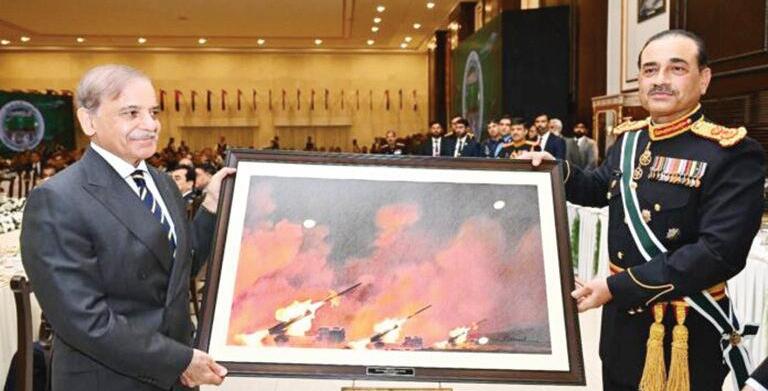







t Pakistan Telecommunication Authority (PTA)
and 0 30% for those above Rs 44,175 Out of 51 tracked items the prices of 13 items increased 14 items fell and 24 remained unchanged Weekly price declines were most notable for chicken which fell by 7 26% onions by 5 43% and garlic by 2 71% Other commodities showing a drop included LPG, potatoes, mustard oil, diesel, pulse masoor, cooking oil, IRRI-6/9 rice, firewood, vegetable ghee (2 5kg), and sugar Conversely, significant weekly price increases were recorded for tomatoes (up 12 01%) eggs (8 16%) and gur (1 50%) Other rising items included bananas various pulses wheat flour powdered milk basmati broken rice, mutton, beef, and energy savers On a year-on-year basis, items with the most substantial price hikes included ladies’ sandals chicken pulse moong powdered milk bananas sugar and eggs all recording doubledigit increases Meanwhile items like onions potatoes garlic electricity charges for Q1 and several staple food products such as tomatoes, wheat flour, and various pulses showed significant price declines over the same period
The Pakistan Textile Council (PTC) has stated that the country s textile and apparel industry could immediately add $3–4 billion in annual exports if provided with an enabling policy environment The remarks were made by PTC Chairman Fawad Anwar during a meeting with Federal Minister for Commerce Jam Kamal Khan according to a statement issued by the Ministry of Commerce on Saturday The PTC delegation also included Asif Tata, Chairman of Naveena Group, and CEO Muhammad H Shafqaat Discussions during the meeting focused on tariff and tax rationalisation energy pricing green investments and other structural reforms necessary for the sector s competitiveness sustainability and export growth Commerce Minister Jam Kamal assured the delegation of the government s support in the upcoming federal budget, reaffirming a commitment to achieving regional tariff parity He said a committee

headed by Finance Minister Muhammad Aurangzeb had been formed to develop a long-term tariff rationalisation framework “We must strike a balance reductions will come with time however the government is committed to supporting industrial growth he said The PTC also voiced concerns over proposed changes to the Export Facilitation Scheme (EFS) and called for the effective use of the Export Development Fund The council stressed the need for immediate clearance of outstanding claims under government support programmes and advocated for the introduction of Green Credit Schemes to meet international sustainability standards The delegation noted that a significant segment of the industry has already adopted renewable energy sources such as solar, wind, and biomass, and that government support is crucial to maintain the sector ’s momentum toward decarbonisation Reiterating

Pakistani expor ters

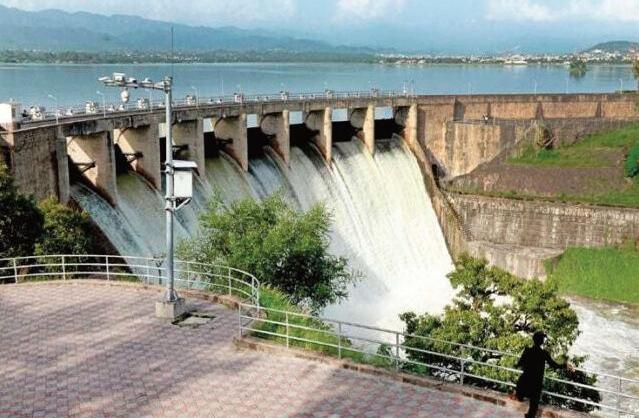
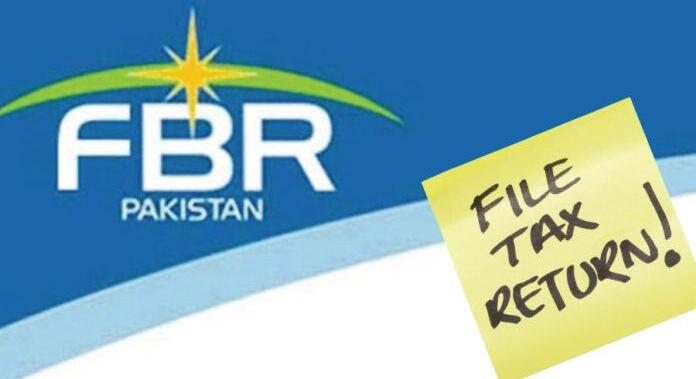



Pakistani expor ters

one expected And it was successful Within days the shelling ceased Peace in the traditional sense was not brought about by Trump s intervention On live television, there was no handshake or formal treaty However, the violence decreased The supply corridors were reopened Without the sound of rockets in the distance Ukrainian citizens returned to their damaged cities Diplomacy wasn t the norm It was unvarnished, quick, and surprisingly successful Trump diplomacy Another crisis simmered half a world away while the situation in Ukraine subsided Following an alleged cross-border attack close to Kashmir tensions between India and Pakistan escalated in South Asia With two rivals armed with nuclear weapons lurching toward conflict once more, the world feared the worst Trump used his personal connections with leaders in New Delhi and Islamabad to engage in covert high-level diplomacy while former President Biden made public appeals for calm Leaked intelligence memos claim that he offered incentives for infrastructure investment to Pakistan in exchange for deescalation while putting economic pressure on India by threatening to mobilize Gulf oil producers against them The outcome? a rare announcement in which both nations agreed to resume diplomatic negotiations and exercise military restraint Trump allegedly stated, "I told them both nobody wins a nuclear war They listened " At least eight times since May 10 Don-

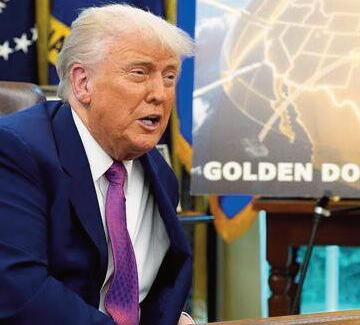
backroom talks with Jordan and Egypt China: According to reports an informal halt in retaliatory sanctions resulted from a previously undisclosed meeting between Chinese tech delegates and Trump-affiliated business envoys in Dubai In Latin America and Africa, Trump s team has been discreetly negotiating investment guarantees and resource access in return for collaborations on migration control Escalation hotspots have significantly d
r i d i c u l e d i n l a t e - n i g h t m o n o l o g u e s According to polls he is not electable He was laughed at by foreign leaders Recent p o l l s , h o w e v e r, p


There s a more dangerous shift at play here than just reactive violence It s the political mainstreaming of suspicion and a recalibration of what it means to be Muslim in India In response to the Pahalgam killings, the Indian government announced Operation Sindoor a military campaign targeting sites in Pakistan which it accused of facilitating the attack - a claim Pakistan has denied While the operation was officially presented as a national security initiative, it marked a major escalation in regional tensions Its aftermath also had domestic repercussions, especially in terms of the perception and treatment of Indian Muslims in public and political discourse Ultranationalist social media accounts have played a major role in fomenting hatred, branding Indian Muslims as infiltrators” and “traitors” The discourse around Operation Sindoor quickly became a litmus test of Indian Muslim patriotism rather than questioning the government s handling of security in Indian Occupied Kashmir - despite the fact that the Pahalgam attack was roundly condemned by Muslims in the country PAYING THE PRICE Historically whenever India and Pak-
made to pay the price: socially politically
now is no exception As writer Hussain Haidry told Middle East Eye: For decades Indian Muslims have been referred to as Pakistanis by a large number of people in India Their ghettos are called ‘Mini Pakistan’ They are mocked as supporters of the Pakistani cricket team whenever there is a cricket match between the two They are abused with the remark Go back to Pakistan So it should not be a shock to anyone in India if its Muslims are harmed in all possible ways by the majority if there are tensions between India and Pakistan, because the cultural framework for this aggravated discrimination and violence is already in place
This time however the backlash has a sharper edge as seen recently in Ambala where a mob chanting Jai Shri Ram torched Muslim-owned shops This was not a spontaneous eruption of communal anger; right-wing groups stepped into the spotlight with open organised aggression The tragedy extends beyond the physical violence itself It s in the way suspicion has become mainstream; in how the concept of Indian Muslim citizenship is being rewritten as conditional, fragile and perpetually suspect This is no sudden flareup Rather it’s the product of years of ideological prepa-
and accused of being Pakistani by a local journalist who later fled the scene His death is emblematic of a climate where suspicion alone can become a death sentence While the guns along the India-Pakistan border might have fallen silent for now, the war over Indian Muslim identity is escalating fought with insinuations
corporations, entertainment industries, governments to confront uncomfortable truths about power, silence, and complicity Soon, faith communities began to ask: what about the church? The church has long been seen as a place of refuge a sanctuary for the weary and wounded Yet, for many survivors of sexual
violence, it has been anything but safe Instead of finding support, many survivors were met with silence blame or even the protection of their abusers
Inspired by #MeToo the #ChurchToo movement emerged as survivors began to share their experiences of abuse within religious spaces Some had suffered at the hands of clergy or church leaders Others had been dismissed shamed or told to “pray about it” when they sought help Many had been taught that submission and silence were godly responses even in the face of harm WHAT MADE #CHURCHTOO UNIQUE?
While #MeToo exposed abuse in secular spaces, #ChurchToo was distinct because it confronted the deep moral and spiritual betrayal that occurs when abuse happens within faith communities Religious institutions are built on trust authority and sacred teachings When these are manipulated to justify or conceal abuse, the damage is not just physical or emotional it is spiritual
The movement forced churches to grapple with difficult questions:
*Why had so many cases of abuse been covered up?
*How had misinterpretations of scripture contributed to silence and victim-blaming?
*What structures needed to change to ensure that churches became places of safety not harm? One of the most significant outcomes of
#ChurchToo was the exposure of systemic cover-ups in high-profile religious institutions Investigations revealed patterns of churches protecting abusers rather than survivors prioritizing reputation over justice This led to increased calls for accountability transparency, and survivor-centred approaches to handling abuse allegations THE POSITIVE OUTCOMES OF #CHURCHTOO
Though painful the movement has led to tangible changes in many faith communities:
*Survivors Found Their Voices: Many who had been silent for years felt empowered to share their stories, knowing they were not alone This broke the isolation that often surrounds abuse
*Churches Began to Take Accountability: Some denominations implemented stricter policies for handling abuse cases ensuring that allegations were taken seriously and not dismissed under the guise of forgiveness
*Harmful Theologies Were Challenged: The movement prompted deeper theological reflection on teachings that have enabled abuse such as distorted views on submission purity culture and male headship More pastors began re-examining how scripture is taught, ensuring that messages of justice, dignity, and equality are at the forefront
*Women’s Leadership Was Amplified:
Recognizing that silencing women had contributed to a culture of impunity many churches made efforts to include more
women in leadership decision-making and pastoral care roles THE CHURCH AS PART OF THE PROBLEM AND THE SOLUTION For the past six years, I ve worked with churches through SASA! Faith, helping them prevent GBV from a faith perspective And I’ve seen both sides of this issue On one hand churches can be places of healing community and radical transformation On the other, they have often been complicit whether through silence, harmful teachings, or outright cover-ups But here’s the truth: the church doesn’t have to be part of the problem It can be part of the solution And in many places we re already seeing that happen CHANGE STARTS IN LOCAL COMMUNITIES In our work with SASA! Faith, we ve seen firsthand how churches can move from passive bystanders to active responders I remember one pastor who after engaging with the program realized that his past sermons had unintentionally discouraged women from speaking out about abuse He made a commitment to preach differently, to listen more, and to ensure that his church became a place of refuge, not a place of shame In another community, women who once felt invisible in church decision-making are now leading conversations on governance shaping policies that prioritize safety and inclusion Men too are engaging not just as allies but as co-labourers in the fight against GBV Building on this momentum, we also implemented the Speak Out Campaign in collaboration with the Zimbabwe Heads of Christian Denominations (ZHOCD) This advocacy initiative sought to normalize conversations on GBV within faith spaces en-
couraging church leaders

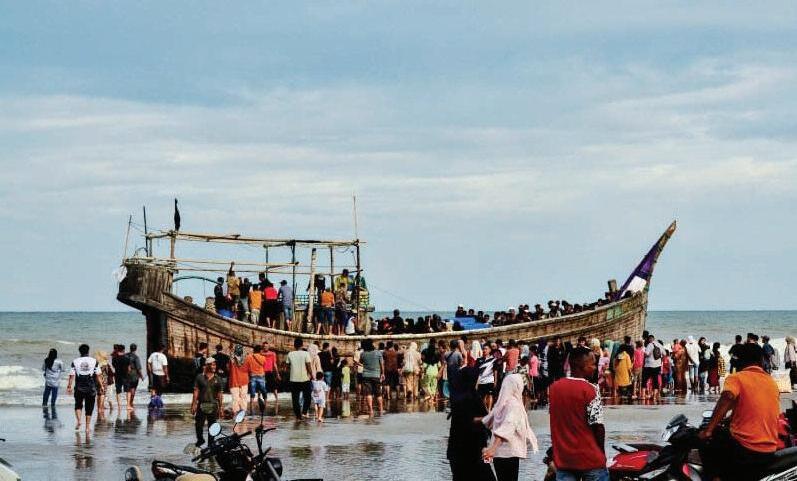
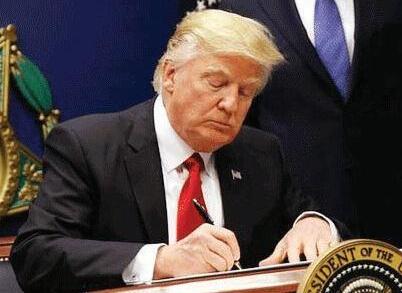





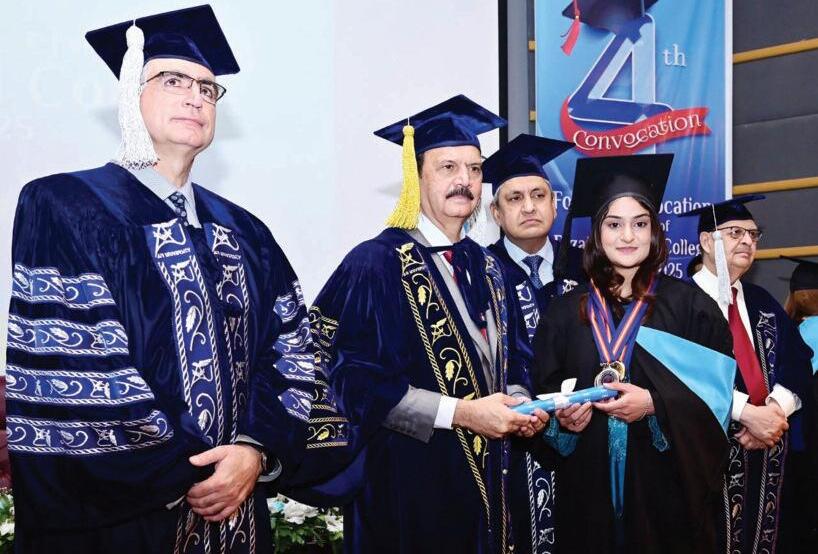

IW T a test c ase for world if is violated, none of int ’l treaties will sur vive: S eminar
ISLAMABAD S TA F F R E P O R T
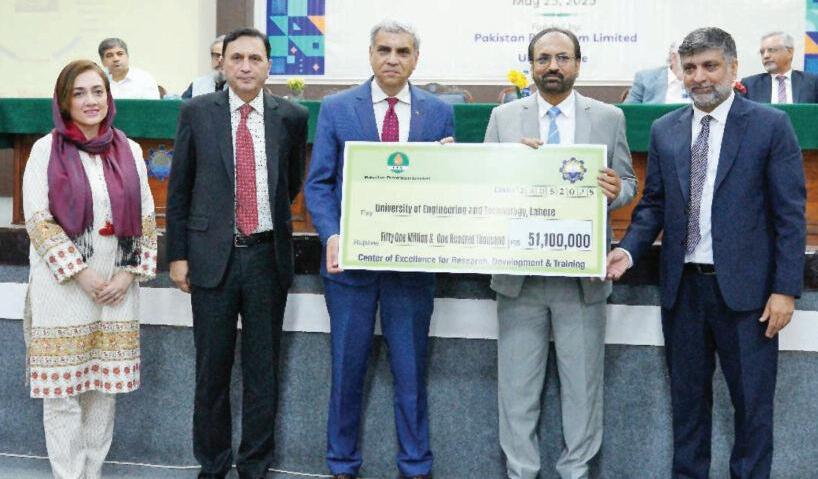
Unilaterally holding Indus Water Treaty (IWT) in abeyance by India is tantamount to an Act of War as this water is the lifeline of 250 million Pakistani people Therefore, we will take the water issue to the end stage to protect the interest of our people said Federal Minister for Water Resources Muhammad Moeen Watto
He was speaking in a seminar titled Indian Imperialism on Pakistan Water: Are New War Clouds Lurking, Consequences and Way Forward ” organized by the Institute of International Relations and Media Research (IIRMR) at a local hotel here on Saturday
The federal minister cautioned about India s sinister intention to weaponize water against Pakistan, saying in coming days we should be on high alert against India’s wickedness However he said so far Pakistan has been experiencing a normal flow of water from the In-
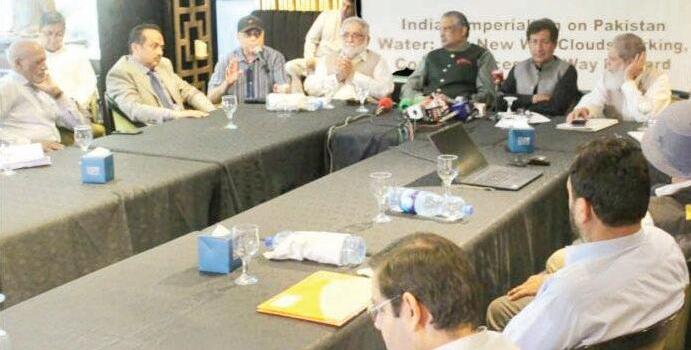
dian side which is a good omen Unmasking India s pre-planned maliciousness, he said India wrote a letter on 18th April on the water issue seeking a reply from Pakistan But without awaiting Pakistan’s stance India blatantly announced the suspension of IWT he added He assured me that as per law neither IWT can be annulled nor can it be suspended unilaterally Institute of International Relations & Media Research (IIRMR) Chairman Muhammad Mehdi and President Yasir Habib Khan said
that India has no capacity to cut off Indus River water because only five percent water flow comes from the Indian side The same is the case with the Jhelum River, they added “Rest of the mischievous effort will be exerted only at the Chenab River And in such a case if it is orchestrated it will take many years to materialize, they said Besides, IWT is a test case for the world, they said If it is violated, then none of the international treaties will survive they opined
Randhawa aler ts CDA , MCI, and district admin to emergency operations post-storm and hailstorm
ISLAMABAD
S TA F F R E P O R T
In response to the heavy rainfall and hailstorm in Islamabad the Capital Development Authority (CDA) Islamabad Metropolitan Corporation (MCI) and District Administration Islamabad have launched a joint emergency operation on the directives of CDA Chairman, Chief Commissioner of Islamabad, and DG Civil Defense Muhammad Ali Randhawa All field teams have been mobilized immediately with clear instructions to provide maximum relief and assistance to citizens with best of abilities In line with the directives of Chairman CDA the Emergency & Disaster Management Directorate, along with the Sanitation, Environment Wing, Building Control, Islamabad Water Agency, Road and Maintenance Wing CDA have been directed to swiftly remove fallen trees debris and other obstructions from all major roads in Islamabad Efforts to expedite road cleaning and restore normal traffic flow have been prioritized The staff and machinery from the Sanitation, Environment and Engineering Wings have been deployed to clear blockages in the city’s drains, waterways, and underpasses A special monitoring mechanism has been activated to ensure effective drainage in low-lying areas underpasses and key roads CDA and DMA MCI and District Administration officials are present on the ground to supervise all operations directly

led by Chairman Mr Fawad Anwar Mr Asif Tata (Chairman Naveena Group) and CEO Mr Muhammad H Shafqaat met with the Federal Minister for Commerce Jam Kamal Khan The meeting focused on tariff and tax rationalization, energy pricing, green investments, and other policy interventions needed for competitiveness sustainability and growth of the textiles and apparel sector The Chairman Anwar emphasized that the industry could immediately contribute US$ 3-4 billion in annual exports, in line with the Vision and Policies of the Federal Government, if an enabling environment is provided During the meeting, the Commerce Minister assured the delegation of the government’s commitment to supporting the export sectors in the upcoming Federal Budget We are working towards regional tariff parity Jam Kamal stated adding that a committee led by the Finance Minister has been constituted to develop a sustainable framework for tariff rationalization He noted, “We must strike a balance reductions will come with time however the Government is committed to supporting industrial growth


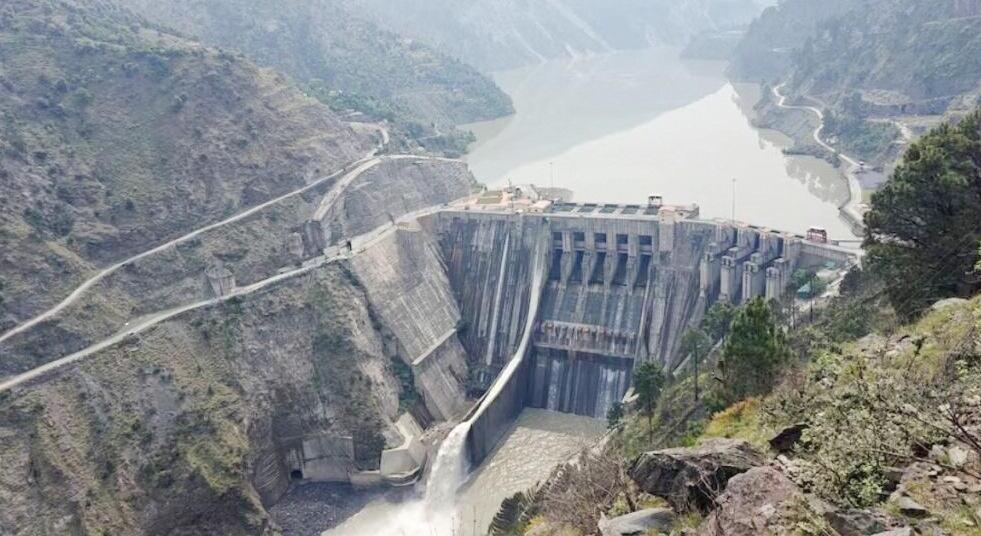
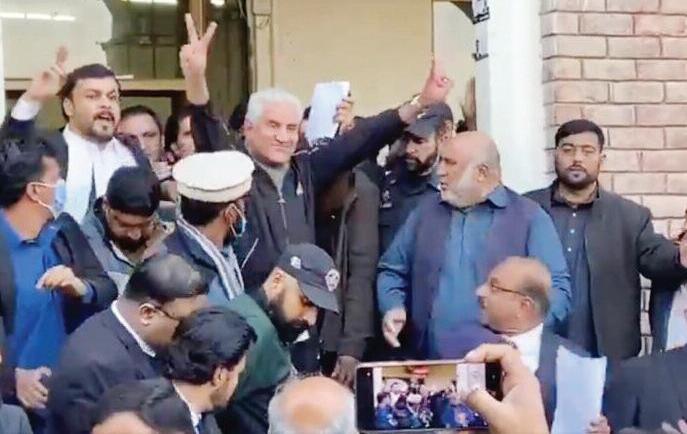
special central court had already on October 12 2022 acquitted Prime Minister Shehbaz Sharif and his son Hamza Shehbaz in the same case
Govt to cancel passports of deported Pakistanis, register cases against them
ISLAMABAD S TA F F R E P O R T
Interior Minister Mohsin Naqvi on Saturday said that the passports of the Pakistanis, who were returning to the country after being deported, will be cancelled and also face the registration of an first information report (FIR) against them Saudi Arabia deported a total of 5 033 Pakistani beggars
whereas another 369 individuals have been apprehended for begging in five other countries in the last 16 months Last month, the interior minister had said that the government would block the passports of Pakistanis deported, and tighten the process of issuing new travel documents Around 106 Pakistanis were also deported from European countries arrived in Islamabad last month
According to state-run PTV News an important meeting led by the interior minister was held in Islamabad where it was decided that deportees who were coming back will have their passports cancelled and an FIR will also be registered against them
The names of the deportees will also be put on the passport control list for five years PTV News added
